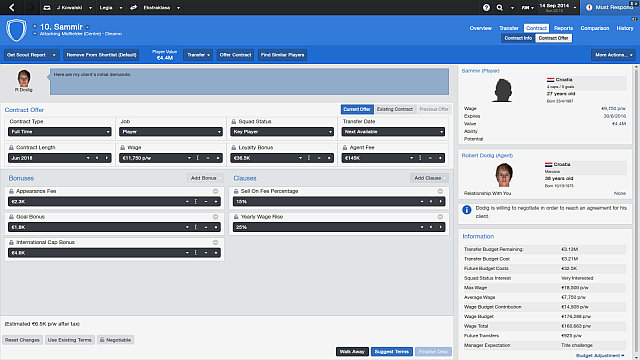Contract negotiations | Transfers

Finishing negotiations are not the final point, you also have to negotiate the player's contract.
Main terms of contract:
Contract type | Type of contract for the player (professional, junior). |
Job | In these negotiations it's a player, of course. Retiring players can be hired as future coaches. |
Squad status | Indispensable - main player, star of your team, appearing very often in the main eleven. Important first team player - also main player, he can take a rest more often. Used in squad rotation system - player used in rotation, often in the first team. Backup to the first team - he enters the field when you don't have better players. Hot prospect for the future - a young player who has a chance of making his way to the first team. Decent young player - a young player from whom you don't expect too much. Not needed by the club - a player you want to get rid of. Of course impossible to offer during negotiations. |
Transfer date | When the contract starts |
Contract length | Duration of the contract |
Wage | Wage for the player. Players with better status expect a better wage while being more interested in changing a club. |
Loyalty bonus | Bonus paid during the contract. If you sell the player earlier, you won't get part of it. |
Fee for agent | Fee for the player's agent. They are often greedy but a proper payment will provide a fluidity of negotiations. |
Bonuses for players.
Appearance fee | Bonus for every match played during a season |
Goal | Bonus for scoring a goal. |
Clean sheet | Bonus for a goalkeeper for finishing a match without losing points. |
Team of the year | Bonus for being chosen for the league's team of the year. |
International cap | Bonus for every game in the national team. |
Bonus for unused substitute | Bonus for matches spent as a substitute without going on the field. |
Clauses - the last element of negotiations.
Minimum fee release clause | You'll be forced to accept every offer of buying that matches a set price. |
Relegation release clause | The player will be able to leave your club for a set amount of money if you're relegated to lower league. |
Yearly wage rise | The player's earnings will be increased by a percentage of his wage. Be careful with long-term contracts, every year you'll pay more (percentage of increased wage). |
Sell on fee percentage | After a next transfer, the player will get a selected percentage of fee. |
Seasonal landmark goal bonus | Bonus will be paid after shooting a selected amount of goals during the season. |
One-year extension after league games (final season) | In the final season of the contract, when the player appears in a selected number of matches, his contract will be extended automatically. |
Match highest earner clause | The player's wage will match the wage of the highest earner in the team. |
Wage after reaching club career league games | After a set amount of appearances, player's wage will increase. |
Top division relegation wage drop | Player's wage will drop in case of relegation. |
Minimum fee release clause (foreign clubs) | Minimum fee release clause for foreign clubs. |
Minimum fee release clause (domestic clubs) | Minimum fee release clause for domestic clubs. |
Extending by the club | This clause lets you extend the contract at any time. |
Pay attention to what you offer to the player. Right clauses and bonuses can be a good way to convince him to go to your club. Check which ones are the best for you.
If you want to avoid the ridiculous terms of agents, try to look for players without agents. Most good player have them so you have to search for young ones.
Agents
During the contract negotiations, you'll very often have to deal with agents. They're responsible for negotiations (of course they take money for that). The more successful negotiations you had with an agent, the more chance that next ones will be successful too. When you read an agent's profile, you'll see if he tries to sell players at all cost, if he's patient etc.
You are not permitted to copy any image, text or info from this page. This site is not associated with and/or endorsed by the SEGA or Sports Interactive. All logos and images are copyrighted by their respective owners.
Copyright © 2000 - 2025 Webedia Polska SA for gamepressure.com, unofficial game guides, walkthroughs, secrets, game tips, maps & strategies for top games.
